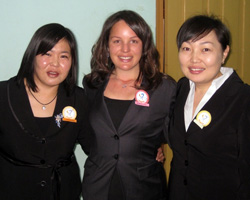27 May 2010

VSO volunteer Health Manager, Melinda Soos, shares her experiences of living and working in regional Mongolia.
Greetings from Mongolia where I work as an Organisational Development Adviser at the rural government-funded Uvurkhangai Regional Diagnostic and Treatment Centre (URDTC) in Arvaikheer. The Centre treats 15,000 patients annually and has 272 staff. I assist top management to build their leadership, planning, and control capacities, as well as to orient the URDTC towards a more client-centred service provision. I was recruited and trained by Australian Volunteers International (AVI) in early 2009, and posted to sunny Mongolia in August last year to work under the auspices of Volunteer Service Overseas (VSO), whose mission it is to promote volunteering to address poverty and disadvantage. I will hold this post for twelve months.
Mongolians are resilient people. Once Mongolia bloodlessly became independent almost two decades ago, the Soviet "capital funds" were withdrawn. Food prices soared, State jobs disappeared and some who could no longer afford heating to stave off the devastating continental winters, returned to the safety of their past nomadic lives. Relatively well-paid clinicians found themselves in the same food queues as street sweepers.
Mongolia has a population of 2.6 million who have a life expectancy of 66 years. One third live below the poverty line and unemployment is up to 50% in some towns. This background provides rich challenges for volunteers. Many of the issues a health manager experiences in Australia are similar here: thinking strategically, budgeting, managing and training people, and building partnerships. Comparatively, the resources here are severely reduced. For example, I have only a whiteboard and markers for the two weekly English Clubs I teach; no printer, paper or teaching resources for the 67 attendees crammed into rooms.
Each day the most important questions for me are "How can this be done effectively?" and "What is the most sustainable approach?" It's often easy to develop training for my enthusiastic Mongolian colleagues, but it's much harder to work towards changing current operational structures and systems. A Communist-influenced "sense of entitlement" linked with low morale, job satisfaction and few opportunities for personal development obstruct this process. There is a great emphasis on planning but not on how to develop appropriate activities to achieve goals using available and appropriate resources effectively.
My colleagues are surprised that management meetings are regularly held and well-attended in Australia. Being consistent in word and deed is extremely powerful. My first challenge has been to integrate myself as part of the management team, build confidence, develop a two-way learning environment, and gain their trust. Without trust, my work will fail.
The role of a health manager in Mongolia is a diverse and unique one. The support of both AVI and VSO enables volunteers to overcome cultural differences, build strong relationships, and access vital resources. The ethic of both organisations means my role was requested by the URDTC; I pass my skills on to my colleagues. Volunteering promotes development. It has also challenged me personally not only to become more resilient - it's -26°C as I write this - and cook cabbage in twenty different ways, but to think laterally, hone my perception and consider my values. When you've been told for the seventh time your training has been cancelled, you're living through the worst winter, tzud, in 30 years, or you're grounded indefinitely due to a state of emergency, laughter is your key to survival. Being a volunteer is an honour and a privilege. If ever you have the opportunity to make this kind of difference, grasp it, do your best, and most of all, learn from it.
Courtesy of Australian Volunteers International www.australianvolunteers.com and the VSO/AVI partnership, visit www.australianvolunteers.com/vso
|

